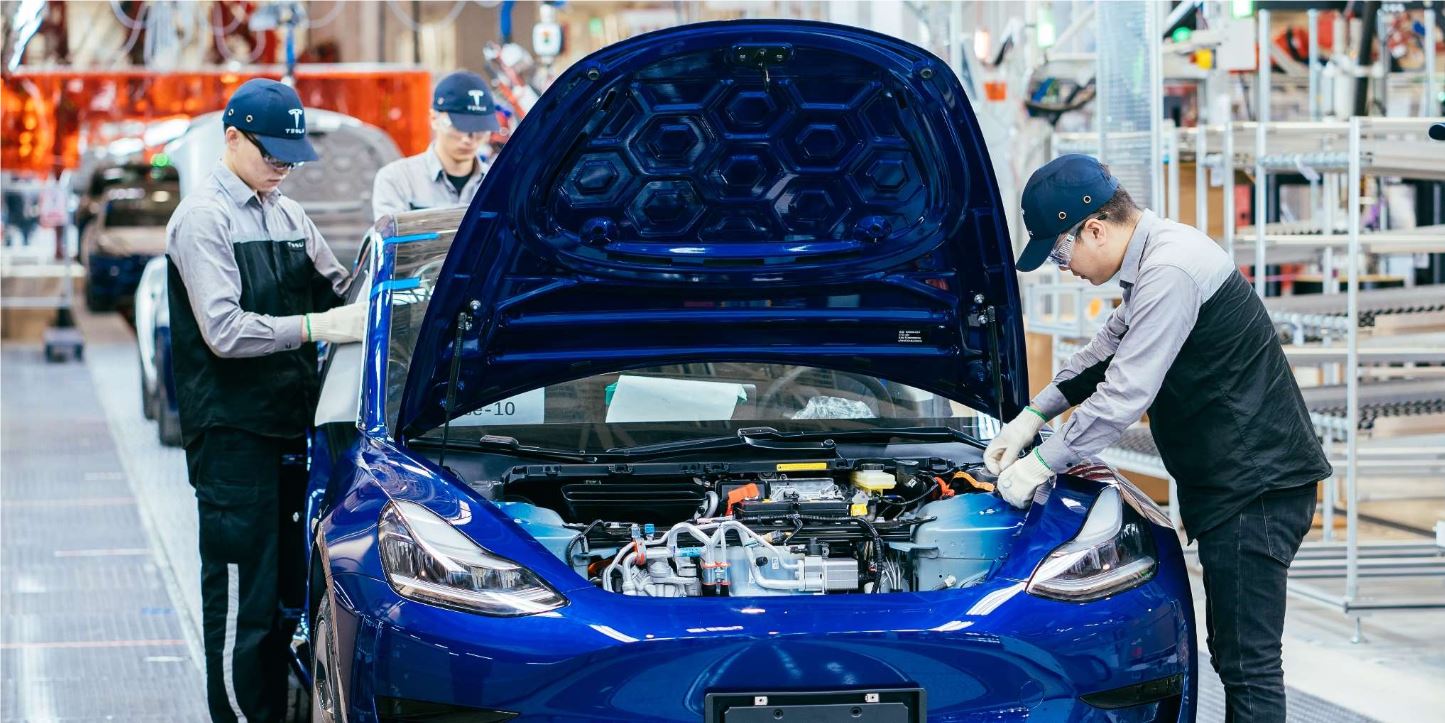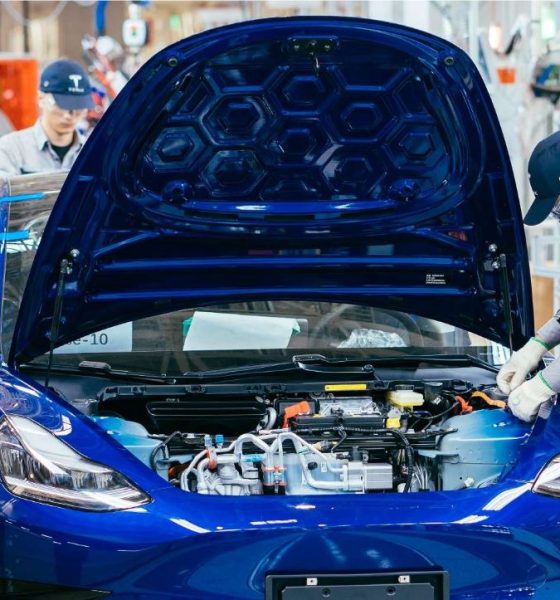

News
Tesla China momentum ‘a positive’ as company navigates new competition
Tesla (NASDAQ: TSLA) had a strong showing in China in May, giving Deutsche Bank a reason to call the company’s performance “a positive” for the company moving forward. However, the Wall Street-based firm has convictions about Tesla’s performance moving forward, according to a new note to investors, as the company will likely face some pushback from Government action and new, local competition.
Figures from the Chinese Passenger Car Association (CPCA) revealed a strong performance in May for Tesla. The Model Y all-electric crossover led the charge ahead of its sibling Model 3 sedan. The numbers catalyzed a sigh of relief from Tesla investors, especially those who read The Information’s report claiming orders had halved to below 10,000 units collectively in China in May. The report was met with criticism and skepticism, including some words from CPCA Secretary General Cui Dongshu, who claimed that May orders wouldn’t have affected May sales figures. Dongshu was correct, as CPCA figures indicated a 29% increase in sales in May compared to April.
The CPCA figures alleviated many concerns, especially those of Deutsche Bank analysts, who revealed in a new note to investors this morning that the strong figures showed healthy demand in both China and Europe, along with hints that Tesla sold its entire Model 3 production capacity in the last two months.
Tesla China sales rise 30% in May, definitively debunks reports of weak demand
The note said (via David Tayar):
“We view May’s data as a positive for Tesla, not only disproving concerns around collapse in demand, but also showing that between local retail sales and exports, Tesla essentially sold its entire Model 3 production capacity in both April and May, and Model Y is ramping up fast in China.”
Deutsche Bank on Tesla/China ??
“We view May’s data as a positive for Tesla, not only disproving concerns around collapse in demand, but also showing that between local retail sales an exports, Tesla essentially sold its entire M3 production capacity in both April/May.”$TSLA pic.twitter.com/o0FMnw0uBG
— David Tayar (@davidtayar5) June 10, 2021
While The Information’s report attributed the weak order figures to “public outcry and government criticism,” Tesla is likely not facing too much of an issue with these two theories, at least for now. However, Deutsche Bank’s note also detailed some concerns that investors may have in the long-term spectacle of Tesla’s Chinese demand.
The firm wrote in its note:
“At the same time, it is unlikely completely eliminate investor concerns that consumer sentiment around Tesla could be losing momentum in China, partly as a result of government action, but also with the rise of local competition. In fact, the article from the Information was supposedly about new orders, rather than sales, so any weakness wouldn’t necessarily have been seen in May sales yet.”
Interestingly, this aligns with Dongshu’s comments about the Information’s report, where the CPCA executive said:
“Usually, monthly sales are accumulated units of orders over previous months, so the immediate results in May might not truly reflect whether the recently reported accidents have had any real impact on Tesla’s sales.”
Tesla has continued a tradition of being one of the most popular automakers in China since its introduction in the market in early 2020. Tesla was the most popular manufacturer in China in 2020, and the only car that has managed to outsell the Model 3 and Model Y is the Wuling HongGuang Mini EV that sells for only $5,000.
Disclosure: Joey Klender is a TSLA Shareholder

News
Tesla ships out update that brings massive change to two big features
“This change only updates the name of certain features and text in your vehicle,” the company wrote in Release Notes for the update, “and does not change the way your features behave.”

Tesla has shipped out an update for its vehicles that was caused specifically by a California lawsuit that threatened the company’s ability to sell cars because of how it named its driver assistance suite.
Tesla shipped out Software Update 2026.2.9 starting last week; we received it already, and it only brings a few minor changes, mostly related to how things are referenced.
“This change only updates the name of certain features and text in your vehicle,” the company wrote in Release Notes for the update, “and does not change the way your features behave.”
The following changes came to Tesla vehicles in the update:
- Navigate on Autopilot has now been renamed to Navigate on Autosteer
- FSD Computer has been renamed to AI Computer
Tesla faced a 30-day sales suspension in California after the state’s Department of Motor Vehicles stated the company had to come into compliance regarding the marketing of its automated driving features.
The agency confirmed on February 18 that it had taken a “corrective action” to resolve the issue. That corrective action was renaming certain parts of its ADAS.
Tesla discontinued its standalone Autopilot offering in January and ramped up the marketing of Full Self-Driving Supervised. Tesla had said on X that the issue with naming “was a ‘consumer protection’ order about the use of the term ‘Autopilot’ in a case where not one single customer came forward to say there’s a problem.”
This was a “consumer protection” order about the use of the term “Autopilot” in a case where not one single customer came forward to say there’s a problem.
Sales in California will continue uninterrupted.
— Tesla North America (@tesla_na) December 17, 2025
It is now compliant with the wishes of the California DMV, and we’re all dealing with it now.
This was the first primary dispute over the terminology of Full Self-Driving, but it has undergone some scrutiny at the federal level, as some government officials have claimed the suite has “deceptive” names. Previous Transportation Secretary Pete Buttigieg was one of those federal-level employees who had an issue with the names “Autopilot” and “Full Self-Driving.”
Tesla sued the California DMV over the ruling last week.
News
Tesla workers push back against Giga Berlin unionization
“IG Metall did not succeed in Giga Berlin‘s works council election earlier today. The union share was reduced from nearly 40% in 2024 to 31% in 2026! This is a clear message by the Giga Berlin team towards an independent co-determination! The list called Giga United, led by the current chairwoman, Michaela Schmitz, received the most votes with more than 40%! Good news for Giga Berlin!”

Tesla workers pushed back against unionization efforts at Gigafactory Berlin, and over the past few years, there has been a dramatic decrease in interest to unionize at the German plant.
Gigafactory Berlin Plant Manager André Thierig announced on Wednesday that IG Metall, the European union group, saw its share reduce from 40 to 31 percent in 2026 as employees eligible to vote on the issue. Instead, the Giga Berlin team, known as Giga United, received the most votes with more than 40 percent.
BREAKING! 🚨
IG Metall did not succeed in Giga Berlin‘s works council election earlier today. The union share was reduced from nearly 40% in 2024 to 31% in 2026!
This is a clear message by theGiga Berlin team towards an independent co-determination!
The list called Giga…
— André Thierig (@AndrThie) March 4, 2026
Thierig gave specific details in a post on X:
“IG Metall did not succeed in Giga Berlin‘s works council election earlier today. The union share was reduced from nearly 40% in 2024 to 31% in 2026! This is a clear message by the Giga Berlin team towards an independent co-determination! The list called Giga United, led by the current chairwoman, Michaela Schmitz, received the most votes with more than 40%! Good news for Giga Berlin!”
There were over 10,700 total employees who were eligible to vote, with 87 percent of them turning out to cast what they wanted. There were three key outcomes: Giga United, IG Metall, and other notable groups, with the most popular being the Polish Initiative.
The 37-seat council remains dominated by non-unionized representatives, preserving Giga Berlin as Germany’s only major auto plant without a collective bargaining agreement.
Thierig and Tesla framed the outcome as employee support for an “independent, flexible, and unbureaucratic” future, enabling acceleration on projects like potential expansions or new models. IG Metall expressed disappointment, accusing management of intimidation tactics and an “unfair” campaign.
The first election of this nature happened back in 2022. In 2024, IG Metall emerged as the largest single faction with 39.4 percent, but non-union lists coalesced for a majority.
But this year was different. There was some extra tension at Giga Berlin this year, as just two weeks ago, an IG Metall rep was accused by Tesla of secretly recording a council meeting. The group countersued for defamation.
Tesla Giga Berlin plant manager faces defamation probe after IG Metall union complaint
This result from the 2026 vote reinforced Tesla’s model of direct employee-management alignment over traditional German union structures, amid ongoing debates about working conditions. IG Metall views it as a setback but continues advocacy. Tesla sees it as validation of its approach in a competitive EV market.
This outcome may influence future labor dynamics at Giga Berlin, including any revival of expansion plans or product lines, which Musk has talked about recently.
News
SpaceX President Gwynne Shotwell details xAI power pledge at White House event
The commitment was announced during an event with United States President Donald Trump.

SpaceX President Gwynne Shotwell stated that xAI will develop 1.2 gigawatts of power at its Memphis-area AI supercomputer site as part of the White House’s new “Ratepayer Protection Pledge.”
The commitment was announced during an event with United States President Donald Trump.
During the White House event, Shotwell stated that xAI’s AI data center near Memphis would include a major energy installation designed to support the facility’s power needs.
“As you know, xAI builds huge supercomputers and data centers and we build them fast. Currently, we’re building one on the Tennessee-Mississippi state line. As part of today’s commitment, we will take extensive additional steps to continue to reduce the costs of electricity for our neighbors…
“xAI will therefore commit to develop 1.2 GW of power as our supercomputer’s primary power source. That will be for every additional data center as well. We will expand what is already the largest global Megapack power installation in the world,” Shotwell said.
She added that the system would provide significant backup power capacity.
“The installation will provide enough backup power to power the city of Memphis, and more than sufficient energy to power the town of Southaven, Mississippi where the data center resides. We will build new substations and invest in electrical infrastructure to provide stability to the area’s grid.”
Shotwell also noted that xAI will be supporting the area’s water supply as well.
“We haven’t talked about it yet, but this is actually quite important. We will build state-of-the-art water recycling plants that will protect approximately 4.7 billion gallons of water from the Memphis aquifer each year. And we will employ thousands of American workers from around the city of Memphis on both sides of the TN-MS border,” she noted.
The Ratepayer Protection Pledge was introduced as part of the federal government’s effort to address concerns about rising electricity costs tied to large AI data centers, as noted in an Insider report. Under the agreement, companies developing major AI infrastructure projects committed to covering their own power generation needs and avoiding additional costs for local ratepayers.








